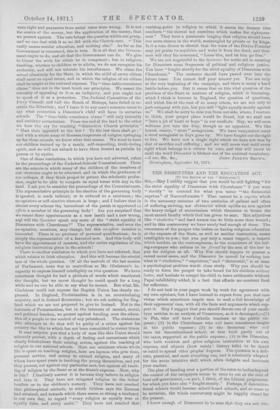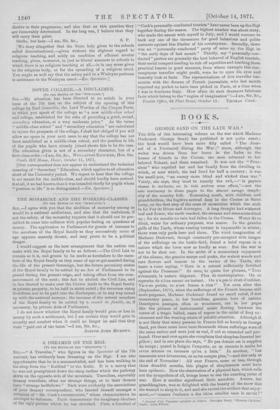THE DISSENTERS AND THE EDUCATION ACT.
ITO 'MK EDITOlt OF TR& " SPEOTAT0R,1
Sin,—May I mildly suggest that you would be still fighting " for the strict equality of Dissenters with Churchmen" if you were " stoutly " to contend for what you name " the dictatorial
caprices" of Nonconformists ? That cannot be a caprice which is the necessary outcome of two centuries of gallant and often of suffering striving, nor dictatorial which uplifts an arm against the heavy cudgel of sectarianism which threatens to bruise the most sacred faculty which God has given to man. Hot adjectives like "vindictive " and hard names can do little more than wound ; and in this controversy we have surely had enough of these. The conscience of the pauper who insists on having religious education at the expense of the State, as well as secular instruction, seems intelligible to you ; but you pay only a scant respect, a respect which borders on the contemptuous, to the conscience of the toil- ing ratepayer who refuses to be forced by the arm of the law to pay for religion at all. Why Pat should happen to possess a sacred moral sense, and the Dissenter be moved by nothing but what is " vindictive," " capricious," and " dictatorial," is at least a psychological problem worth close study. Why you should be ready to force the pauper to take bread for his children without butter, and hesitate to compel his child to learn arithmetic without Papal iufallibility added, is a fact that affords me constant food for reflection.
I do not look in your pages week by week for agreement with my own opinions, but I have learned to expect from you that rare virtue which sometimes impels men to seek a full knowledge of their opponents' case, with all the facts and arguments which sup- port it. May I suggest that you should devote one of your small- type articles to an analysis of Conscience, as it is developed,—(1) in Pat, who will have Catholic teachers at the public ex- pense; (2) in the Churchman who will have catechisms taught at the public expense ; (3) in the Sectarian who will have his denominational school, at first built partly out of the taxes, supported at the public expense ; (4) in the Dissenter, who both receives and gives religious instruction at his own expense, and objects (how vainly ! history tells) to be taxed or rated to spread other peoples' dogmas. The question is a deli- cate, practical, and most absorbing one, and is admirably adapted for the acute intuitive skill which often delights and instructs your readers. The plan of handing over a portion of the rates to bodies beyond the control of the ratepayers seems to some to cut at the root of local self-government,—a part, I think, of the Liberal programme for which you have also " fought stoutly." Perhaps, if denomina- tional schools would become school-board schools, and so cease to be sectarian, the whole controversy might be happily closed for the present.
I know enough of Dissenters to be sure that they are not vin- dictive iu their programme, and also that on this question they are immovably determined. In the long run, I believe that they will carry their point.
Strike, but hear.—I am, Sir, &c., S. P.
[We deny altogether that the State help given to the schools called denominational,—given without the slightest regard to religious teaching, and solely on condition of efficient secular teaching, given, moreover, in just as liberal amounts to schools in which there is no religious teaching at all,—is in any sense given to the religious body, or for the spreading of a religious creed. You might as well say that the salary paid to a Wesleyan postman is assistance to the Wesleyan creed.—En. Spectator•.]



































 Previous page
Previous page